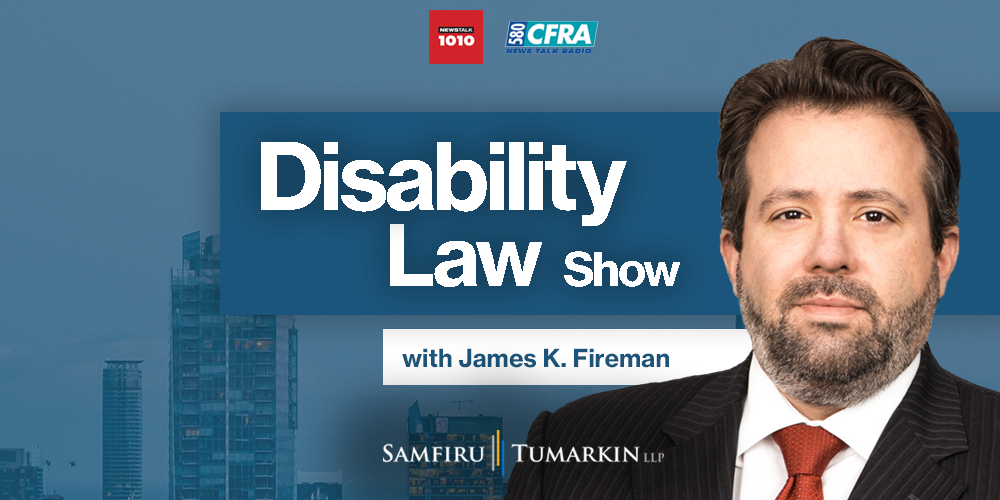Disability Law Show Bell Radio – S3 E29

Episode Summary
Discover your rights and the truth about insurance companies and long-term disability claims on Season 3 Episode 29 of the Disability Law Show on Newstalk 1010 in Toronto.
Listen below to James Fireman and Tamar Agopian, Disability lawyers at Samfiru Tumarkin LLP, as they guide you through the proper steps to take when your insurance provider cuts off your long-term disability or denies your insurance claim.
Listen to the Episode
Episode Notes
I have severe depression and my doctor says I am unable to return to work. My LTD was cut off after a year and a half. What should I do?
Claimants on long-term disability often have their benefits cut off before or shortly after the two-year mark. This occurs typically as the change of definition for disability changes after two years and is more difficult to prove. Mental illnesses are typically difficult to prove and claimants with depression and anxiety are often denied benefits. It is important to contact a disability lawyer when denied as they are able to contact the insurance company and request all of the appropriate documentation. Claimants who are told to do other occupations should be wary of the positions offered as they have to be comparable to their own previous position.
My insurer sent my file to a doctor for a medical review. I suffered from a concussion and have had lingering symptoms. My claim was denied after my file was assessed. How is this possible?
Some doctors work closely with insurance companies and are often called upon to assess claimants. It is important for claimants to look closely at those who are called upon to have an opinion on their medical condition. The treating or assessing medical team must be well versed in the client’s actual condition and symptoms.
LEARN MORE
• Doctor and Treating Health Professional Reports
When I requested a copy of the disability contract I was refused a copy and told to talk to my employer for a copy. What can I do?
While insurance companies are obligated to provide claimants with their disability policy, they are often refused or had their requests delayed. Often in group policies, the policyholder is the employer. However, employees are considered insured under the policy and are entitled to a copy. Claimants should put their request in writing as well as the insurer’s refusal. The refusals that are documented can later be used against the insurance company during the legal process as the adjuster is seen as operating in bad faith.
I’ve been receiving LTD benefits for over 2 years. I’ve had multiple surgeries and am still not able to return to work. My insurer has left me a voicemail saying they want to set me up with a medical appointment. Do I have to agree to this?
It is important to distinguish whether or not a medical appointment is for an assessment or for treatment. Insurance companies are permitted to ask claimants to attend a medical assessment and claimants must attend. While claimants should be seeking treatment, they cannot be forced by the insurer to go to the treatment or specialist that the insurance company recommends and can instead seek their own medical professionals.
I’m on LTD and my insurer asked me to apply for CPPD. I applied but was denied and have since appealed multiple times upon the request of my insurer. Do I have to keep doing this?
Claimants do not have to keep appealing however an insurer might ask for a credit that they would have received if the claimant had been approved for CPP Disability. It does not put a claimant back if they keep appealing for CPP Disability and in many ways would benefit a claimant if they are approved for CPPD. The test in order to qualify for CPPD is generally more difficult than LTD.
I am on LTD right now. I just started it as I was transferred from STD. If I go back to work and cannot continue because of my condition, can I start STD again?
Most LTD policies have a recurrence provision that stipulates that when a claimant returns to work and is unsuccessful if they have to back on disability benefits there is no wait time for their benefits to resume. Claimants who tried to go back to work and are unsuccessful typically face difficult insurance adjusters as they often argue that a claimant has not tried hard enough to resume working and will likely cut off benefits.




